Why spend 16 weeks in class when you can get the same college credits in 8 weeks or less? Accelerated classes let you finish your courses in half the time.
Yes, half the time.

Editorial Listing ShortCode:
Complete List of Colleges with Accelerated Online Courses
Methodology: The following school list is in alphabetical order. To be included, a college or university must be regionally accredited, offer degree programs online or in a hybrid format, and have accelerated classes that are 8 weeks or less in duration.
| Rank | University | Featured Image | tbl-programs | Location | mdgtbl-description | |
|---|---|---|---|---|---|---|
American Intercontinental University |
PROGRAMOnline
|
LOCATIONIllinois
|
ACCREDITATIONHLC
|
AIU is regionally accredited by the Higher Learning Commission.
|
||
Brenau University |
PROGRAMOnline
|
LOCATIONGeorgia
|
ACCREDITATIONSACSCOC
|
Brenau is accredited by the Southern Association of Colleges and Schools.
|
||
Cameron University |
PROGRAMOnline
|
LOCATIONOklahoma
|
ACCREDITATIONHLC
|
CU is unconditionally accredited through the Higher Learning Commission.
|
||
Central Texas College |
PROGRAMOnline
|
LOCATIONTexas
|
ACCREDITATIONSACSCOC
|
CTC is accredited by the Southern Association of Colleges and Schools.
|
||
Charter Oak State College |
PROGRAMOnline
|
LOCATIONConnecticut
|
ACCREDITATIONNECHE
|
COSC is accredited by the New England Commission of Higher Education.
|
||
College of DuPage |
PROGRAMOnline
|
LOCATIONIllinois
|
ACCREDITATIONHLC
|
COD is accredited by the Higher Learning Commission.
|
||
College Of Southern Nevada |
PROGRAMOnline
|
LOCATIONNevada
|
ACCREDITATIONNWCCU
|
CSN has been continuously accredited by the Northwest Commission on Colleges and Universities since 1975.
|
||
Colorado State University |
PROGRAMOnline
|
LOCATIONColorado
|
ACCREDITATIONHLC
|
Colorado State is accredited by the Higher Learning Commission.
|
||
Colorado Technical University |
PROGRAMOnline
|
LOCATIONColorado
|
ACCREDITATIONHLC
|
CTU is accredited by the Higher Learning Commission.
|
||
Columbia College |
PROGRAMOnline
|
LOCATIONMissouri
|
ACCREDITATIONHLC
|
Columbia has been accredited by the Higher Learning Commission since 1918.
|
||
Davenport University |
PROGRAMOnline
|
LOCATIONMichigan
|
ACCREDITATIONHLC
|
Davenport is accredited by the Higher Learning Commission.
|
||
Elizabethtown College |
PROGRAMOnline
|
LOCATIONPennsylvania
|
ACCREDITATIONMSCHE
|
E-town is accredited by the Middle States Commission on Higher Education.
|
||
Ellis College of NYIT |
PROGRAMOnline
|
LOCATIONNew York
|
ACCREDITATIONMSCHE
|
NYIT is accredited by the Middle States Commission on Higher Education.
|
||
Excelsior College |
PROGRAMOnline
|
LOCATIONNew York
|
ACCREDITATIONMSCHE
|
Excelsior is accredited by the Middle States Commission on Higher Education.
|
||
Fisher College |
PROGRAMOnline
|
LOCATIONMassachusetts
|
ACCREDITATIONNECHE
|
Fisher is accredited by the New England Commission of Higher Education.
|
||
Granite State College |
PROGRAMOnline
|
LOCATIONNew Hampshire
|
ACCREDITATIONNECHE
|
Granite State is accredited by the New England Commission of Higher Education.
|
||
Indiana Institute 0f Technology |
PROGRAMOnline
|
LOCATIONIndiana
|
ACCREDITATIONHLC
|
Indiana Tech is accredited by the Higher Learning Commission.
|
||
Indiana Wesleyan University |
PROGRAMOnline
|
LOCATIONIndiana
|
ACCREDITATIONHLC
|
IWU is accredited by the Higher Learning Commission.
|
||
Keiser University |
PROGRAMOnline
|
LOCATIONFlorida
|
ACCREDITATIONSACSCOC
|
Keiser is accredited by the Southern Association of Colleges and Schools.
|
||
LeTourneau University |
PROGRAMOnline
|
LOCATIONTexas
|
ACCREDITATIONSACSCOC
|
LeTourneau is accredited by the Southern Association of Colleges and Schools.
|
||
Liberty University |
PROGRAMOnline
|
LOCATIONVirginia
|
ACCREDITATIONSACSCOC
|
Liberty is accredited by the Southern Association of Colleges and Schools.
|
||
Lynn University |
PROGRAMOnline
|
LOCATIONFlorida
|
ACCREDITATIONSACSCOC
|
Lynn is accredited by the Southern Association of Colleges and Schools.
|
||
Mount Olive College |
PROGRAMOnline
|
LOCATIONNorth Carolina
|
ACCREDITATIONSACSCOC
|
Mount Olive is accredited by the Southern Association of Colleges and Schools.
|
||
National University |
PROGRAMOnline
|
LOCATIONCalifornia
|
ACCREDITATIONWSCUC
|
NU is accredited by the WASC Senior College and University Commission.
|
||
North Carolina Wesleyan College |
PROGRAMOnline
|
LOCATIONNorth Carolina
|
ACCREDITATIONSACSCOC
|
NCWC is accredited by the Southern Association of Colleges and Schools.
|
||
Park University |
PROGRAMOnline
|
LOCATIONMissouri
|
ACCREDITATIONHLC
|
Park is accredited by the Higher Learning Commission.
|
||
Peirce College |
PROGRAMOnline
|
LOCATIONPennsylvania
|
ACCREDITATIONMSCHE
|
Peirce is accredited by the Middle States Commission on Higher Education.
|
||
Post University |
PROGRAMOnline
|
LOCATIONConnecticut
|
ACCREDITATIONNECHE
|
Post is accredited by the New England Commission of Higher Education.
|
||
Purdue University |
PROGRAMOnline
|
LOCATIONIndiana
|
ACCREDITATIONHLC
|
Purdue has been accredited by the Higher Learning Commission since 1913.
|
||
Regent University |
PROGRAMOnline
|
LOCATIONVirginia
|
ACCREDITATIONSACSCOC
|
Regent is accredited by the Southern Association of Colleges and Schools.
|
||
Regis University |
PROGRAMOnline
|
LOCATIONColorado
|
ACCREDITATIONHLC
|
Regis is accredited by the Higher Learning Commission.
|
||
Saint Leo University |
PROGRAMOnline
|
LOCATIONFlorida
|
ACCREDITATIONSACSCOC
|
Saint Leo is accredited by the Southern Association of Colleges and Schools.
|
||
Southern New Hampshire University |
PROGRAMOnline
|
LOCATIONNew Hampshire
|
ACCREDITATIONNECHE
|
SNHU is accredited by the New England Commission of Higher Education.
|
||
Thomas Edison State University |
PROGRAMOnline
|
LOCATIONNew Jersey
|
ACCREDITATIONMSCHE
|
TESU is accredited by the Middle States Commission on Higher Education.
|
||
Troy University |
PROGRAMOnline
|
LOCATIONAlabama
|
ACCREDITATIONSACSCOC
|
Troy is accredited by the Southern Association of Colleges and Schools.
|
||
University of Houston – Downtown |
PROGRAMOnline
|
LOCATIONTexas
|
ACCREDITATIONSACSCOC
|
UHD is accredited by the Southern Association of Colleges and Schools.
|
||
University of Maine – Augusta |
PROGRAMOnline
|
LOCATIONMaine
|
ACCREDITATIONNECHE
|
UMA is accredited by the New England Commission of Higher Education.
|
||
University of Maryland – University College |
PROGRAMOnline
|
LOCATIONMaryland
|
ACCREDITATIONMSCHE
|
UMUC is accredited by the Middle States Commission on Higher Education.
|
||
University of Massachusetts – Global |
PROGRAMOnline
|
LOCATIONCalifornia
|
ACCREDITATIONWSCUC
|
University of Massachusetts – Global is accredited by the WASC Senior College and University Commission.
|
||
Upper Iowa University |
PROGRAMOnline
|
LOCATIONIowa
|
ACCREDITATIONHLC
|
UIU is accredited by the Higher Learning Commission.
|
||
Walden University |
PROGRAMOnline
|
LOCATIONMinnesota
|
ACCREDITATIONHLC
|
Walden is accredited by the Higher Learning Commission.
|
||
Online Degrees with Accelerated Classes
The following online degrees offer accelerated classes (4 weeks, 6 weeks, or 8 weeks):
- Accounting
- Business Administration
- Computer Science
- Criminal Justice
- Education
- Emergency Management
- English
- Environmental Policy
- Finance
- Fire Science
- Forensics & Crime Scene Investigation
- Health Sciences
- Healthcare Administration
- Human Services
- Information Technology
- Legal Studies
- Liberal Arts
- Management
- Marketing
- Nursing
- Nutrition
- Psychology
- Public Administration
A wide-range of programs are offered by accredited colleges offering 4 week, 5 week, 6 week, and 8 week online college courses. So, if you have been thinking, I need a degree fast, this is a great place to start!
Accounting

If you have a good grasp of numbers and finances, then a career in accounting may be for you.
Accountants often take care of bookkeeping and financial management for organizations or individuals. In preparation for that responsibility, coursework for an accounting degree may cover data analysis, auditing, taxation and mathematics. The types of accounting covered in your program may include financial accounting, managerial accounting and cost accounting.
Editorial Listing ShortCode:
You may also study various business topics, such as management, ethics and corporate law. After graduation, you may choose to start working toward becoming a certified public accountant (CPA).
Business Administration

While some business-minded students choose to earn a degree in finance, management or accounting, others want a course of study that’s less specialized.
If that describes you, consider pursuing a degree in business administration. You’ll take classes such as marketing, finance, accounting, economics, and management. Your studies will prepare you for work in a variety of fields, including sales, banking, human resources and financial analysis.
Editorial Listing ShortCode:
Although the broad scope of a business degree is what draws many students to this program, others want to choose an area of specialization. Concentration options might include Supply Chain Management and Hospitality Management.
Computer Science

To study the inner workings of computers and their many components, consider going to school to earn a degree in computer science.
Computer scientists are professionals who build computers, improve their designs, work with software and perform other technology-related tasks. While earning a degree in computer science, you might take classes in databases, networks, algorithms and mathematics.
Editorial Listing ShortCode:
Your coursework might also cover programming languages and operating systems. After graduation, you could choose to work in the technology department of a large company, help a startup get off the ground or go into business for yourself as an app designer.
Criminal Justice

Earning a degree in criminal justice can give you an advantage when applying for jobs in law enforcement or the court system.
Employers appreciate that degree-holders come into the workforce with training on subjects like psychology, criminology, violence, criminal law and diversity. In this degree program, you may also have the opportunity to study topics of special interest to you, such as the relationship between crime and gender or the way that the juvenile court system works.
Editorial Listing ShortCode:
After completing school, many graduates find employment with police departments. Others go on to work as bailiffs, game wardens, victims’ advocates or dispatchers.
Education & Teaching

Sharing knowledge with the next generation can be a deeply satisfying career.
You can prepare for this position by earning a college degree in education and then becoming licensed in your state. In school, you’ll study curriculum, methods of teaching, classroom management and child development. You’ll also learn more about the subjects that you’re going to teach, such as math, reading or science.
Editorial Listing ShortCode:
You may choose to focus your degree on a particular area of teaching, such as early childhood education, elementary education, secondary education or special education.
Emergency Management
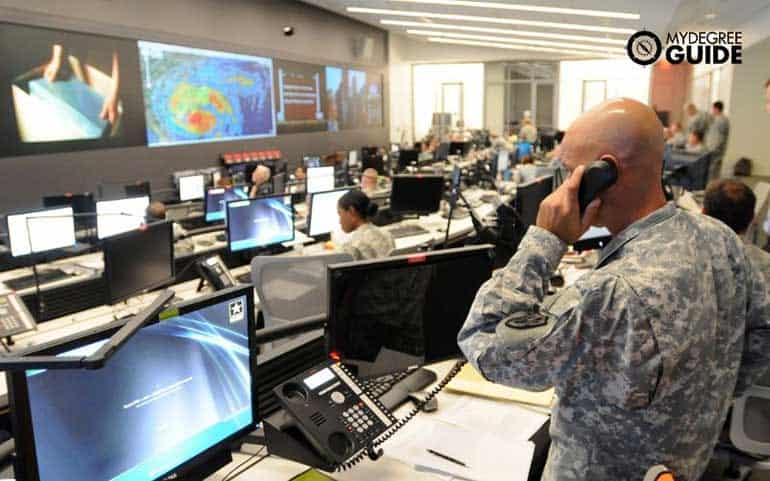
It can be hard to predict when a disaster will strike, so it’s important to have systems and supports in place before an emergency begins.
Earning a degree in emergency management can equip you with the skills to help during natural disasters, terrorist attacks or other stressful situations. Your coursework may cover risk assessment, disaster prevention, recovery efforts, administration and infrastructure.
Editorial Listing ShortCode:
After graduation, you could work could for a government organization like FEMA or the Department of Homeland Security. Other options include serving as a first responder or finding employment with a private company as a security officer or an emergency management coordinator.
English Online College Courses

If you love words and the power that they hold, then you might be well-suited to majoring in English.
This is a versatile degree that can prepare for you a career in journalism, education, editing or public relations. You could also become a professional author or a freelance writer. Your college courses online will probably cover literature from a variety of historical periods.
Editorial Listing ShortCode:
Many programs focus largely on British and American authors, but studying foreign works may be an option for you as well. Other topics covered in an English program may include grammar, creative writing, persuasive writing and poetry.
Environmental Policy

You can turn your passion for the earth into a career when you study environmental policy in school.
Because government regulations play a large role in environmental practices, many degree programs focus heavily on law, politics and public policy. You’ll also study management, sustainability, conservation technology, ethics and budgeting. After graduation, you might find employment with a government agency or work alongside various public organizations.
Editorial Listing ShortCode:
Alternatively, you could educate others on environmental issues, try out your powers of persuasion as a lobbyist, or serve as a land-use consultant. With further education, you could become an environmental scientist or an environmental lawyer.
Finance

As a finance major, you’ll have the opportunity to study the various ins and outs of money. In particular, you may explore ways to make the most of financial resources.
For example, you’ll learn about economics, accounting, budgeting, capital markets, venture capital, equity and risk management. You will develop a skill set to help companies and organizations make sound decisions about how to invest or utilize their money.
Editorial Listing ShortCode:
Possible career paths include banking, real estate, insurance and financial consulting. You could also become a stockbroker, a loan officer, a fund manager or a venture capitalist.
Fire Science

If you have dreams of becoming a firefighter, holding a degree in fire science can give you a competitive advantage.
Students of this discipline study combustion, hydraulics, fire suppression, safety codes and fire prevention. Through classes on management and human resources, you may also acquire skills that will help you lead firefighting teams.
Editorial Listing ShortCode:
In addition to preparing you for work as a municipal firefighter or forest firefighter, this degree could also help you become a prevention specialist or a building code inspector. Some schools offer a concentration in Fire Inspection.
Forensics & Crime Scene Investigation

What exactly happened at the scene of a crime? Forensic investigators have the skills to help uncover the truth in criminal cases.
When you’re earning a degree in crime scene investigation, you’ll learn about evidence collection, fingerprinting, photography, firearms and ballistics. Your studies may require a strong grasp of mathematics, chemistry, psychology and sociology. Additional coursework may equip you to present your forensic findings through reports or in court.
Editorial Listing ShortCode:
Many graduates work in law enforcement or as private detectives. After earning this degree, you may be able to pursue CSI licensure in your state.
Health Science

Earning a degree in health sciences can be an entry point into many different healthcare jobs.
If you want to keep your options open or don’t yet have a final career plan in mind, this can be a flexible educational path to pursue. Alternatively, with the right specialization, such as Pre-pharmacy, an undergraduate degree in health sciences can get you ready for a particular grad program.
Editorial Listing ShortCode:
Other concentration options may include Nutrition, Global Health and Healthcare Administration. Potential career options may include working as a paramedic, a medical technician, a pharmaceutical salesperson or a health services manager.
Healthcare Administration

In addition to doctors and nurses, the healthcare industry also relies heavily on the work of administrative personnel.
With a degree in healthcare administration, you’ll be prepared to head up departments that provide health and wellness services. You could work in a hospital system, a nursing home or a doctor’s office. Other options include getting a job with a government agency, a rehab facility or a drug manufacturer.
Editorial Listing ShortCode:
To prepare you for these positions, your coursework may cover health topics like epidemiology, insurance and hospital accessibility. You’ll also study business principles like marketing, human resources and budgeting.
Human Services

To spend your career helping others, especially those in difficult circumstances, consider earning a degree in human services.
Your coursework may cover sociology, diversity, ethics and public health. Although you may use your human services degree to work directly with the public, most professionals in this field work behind the scenes in administrative capacities.
Editorial Listing ShortCode:
You could serve as a coordinator or a director in corrections facilities, foster care agencies, long-term care facilities, food stamp programs or rehab facilities. Possible concentrations for your degree include Long-term Care, Informatics, Public Relations, Leadership and Addiction.
Information Technology

With a background in information technology, you’ll have the skills to help companies manage their computer systems.
You can also help businesses maximize their effectiveness by putting technology to work in efficient ways. Your college classes may address programming, operating systems, networks and databases. To work in a particular field, some students choose to narrow their IT degree focus by selecting a specialty, such as Cybersecurity, Web Design or Database Administration.
Editorial Listing ShortCode:
After graduation, you may build computer networks, prevent cybercrime, develop software, provide consulting services or join a company’s IT team.
Legal Studies

To get started in the field of law and courts, seek out a degree in legal studies. This type of program will provide you a foundational understanding of the court system, legal proceedings and the laws on which judicial decisions are based.
You could enter the workforce immediately after earning this degree; graduates often work as paralegals, court clerks, human resources professionals or court reporters.
Editorial Listing ShortCode:
Depending on your state, other opportunities, such as serving as a magistrate judge, may be available to you as well. Another option is to continue your education so you can become a lawyer.
Liberal Arts

For a broad college education that will prepare you for working in any number of fields, you might choose to earn a degree in liberal arts.
In such a program, you may study many different disciplines, including language, history, art and philosophy. Your college classes may also provide opportunities to hone your soft skills, such as creative thinking, interpersonal communication and teamwork.
Editorial Listing ShortCode:
There is no shortage of career opportunities available to liberal arts graduates, but some of the top options include customer service, communications and public relations.
Management

If you have your sights set on working in a supervisory capacity, then you should major in management.
Typically thought of as a business degree, a bachelor’s in management will prepare you to lead teams, stores or entire companies. You will study a mix of business concepts and leadership skills. Your business classes may cover topics like budgeting and marketing.
Editorial Listing ShortCode:
Regarding leadership, you may learn about managing projects, coordinating human resources and navigating organizational change. Concentrations available to you may include Supply Chain Management, Accounting and Entrepreneurship.
Marketing

To get started in the advertising field, you could study marketing in college. However, advertising isn’t the only field where you can put a marketing degree to good use.
Other applicable industries include market research, retail, product development, public relations, sales and brand recognition. Your college coursework will probably involve classes in management, finance, human behavior, economics and product management.
Editorial Listing ShortCode:
Skills that can help you in the marketing field include creative thinking, clear communication and an analytical mind. It’s also helpful to be a team player and the type of person who is known for being persuasive and influential.
Nursing

Multiple educational paths can lead you into the nursing field. Earning a bachelor’s in nursing is an approach that will qualify you to become a registered nurse (RN).
With a bachelor’s degree, you’ll probably be given more responsibility than nurses with less schooling, and you may be eligible for a higher salary. For that reason, some people who earned their RN status with an associate’s degree may want to go back to school for a bachelor’s degree.
Editorial Listing ShortCode:
In your nursing program, you’ll study health assessment, nutrition, human development and mental health. Clinicals will give you hands-on nursing experience.
Nutrition

To help others choose nutrient-rich food that will help them achieve their healthy-living goals, go to college for a degree in nutrition.
People with this degree may work in food science, culinary arts, community health, dietetics and marketing. Your coursework will cover a wide range of disciplines, including behavioral health, human anatomy, lifespan development, technology and diet.
Editorial Listing ShortCode:
Some programs may prepare you to pursue certification as a registered dietitian and to qualify for state licensure. If you are interested in that career path, choose a school that’s approved by the Accreditation Council for Education in Nutrition and Dietetics (ACEND).
Psychology

Studying psychology can help you understand the workings of the human mind and the ways that thought influences behavior.
Your classes may cover cognition, human development and statistics. Undergraduate studies in this field can prepare you to work as a case manager, a parole officer or a sales professional. Other fields you might enjoy include childcare, mental health, addiction rehabilitation and career counseling.
Editorial Listing ShortCode:
Keep in mind that practicing as a licensed clinical psychologist will require you to earn a doctorate, but a bachelor’s degree can be a good stepping stone toward that goal.
Public Administration

If you’re interested in a managerial or organizational job in a non-business setting, then a degree in public administration could be an ideal fit.
People with this degree often hold positions with nonprofit organizations or government agencies. Depending on your interests, you might work with budgets, programming, public relations or philanthropy. Classes for this degree program typically cover economics, government, management and statistics.
Editorial Listing ShortCode:
An internship experience may allow you to put your classroom knowledge into practice. If you’d like to pursue a concentration, your options may include Local Government, Public Policy, Nonprofit Administration or Healthcare.

Advantages of Accelerated Classes
The primary advantage of an accelerated course is that you can take a full-time course load while only having to juggle two courses online at a time.
Some of the key benefits of accelerated online classes include:
- Earn 30+ college credits per year while only taking 2 classes at a time
- Login to your classes online, any time of the day or night
- Complete more courses in a shorter period of time
- Earn your degree faster than students enrolled in 16-week courses online
Accelerated courses may be a good option for you if you are highly-motivated and have the ability to learn independently.
Disadvantages of Accelerated Classes
The primary disadvantage of an accelerated course is that you have to cover the same amount of course content in a shorter period of time.
Some of the challenges of accelerated classes include:
- Due to the accelerated pace, you will have to absorb course material more quickly
- Shorter courses mean you will have shorter deadlines for assignments
- Some subjects might seem more difficult to absorb at a faster pace
Although accelerated courses can help you finish your degree faster, you will still have to do the work of an entire semester in a shorter time period.
Accelerated classes vs. Traditional courses
The biggest difference between an accelerated class and a regular class is the pace at which you will be learning the material. This pace also depends on the type of accelerated class you are taking. For example, a 12-week course won’t be as demanding as an 8-week course.
Other differences include:
- Accelerated class assignments are more concentrated and highly-focused
- Greater demand for a structured study regime
- Less time between exams and learning new material
In my experience, the need to find a balance between everyday life and the demands of your coursework is one of the biggest differences between traditional and accelerated courses.
The fast-paced learning environment will require you to spend more time studying and completing assignments, so don’t be surprised if it takes some time for you to find the balance between your education, career, and other daily obligations.
How do I get started?
So, you’ve decided that you want to take an accelerated class…
Now what?
The first step is to pick a college offering accelerated classes and enroll.
Typically, an accelerated class operates in a similar way to traditional classes – just at a faster pace.
Whether you’re a student just out of high school or a working adult returning to college, chances are that you’ve already begun the countdown to graduation.
With the availability of accelerated course options, you can get there faster, and many students (myself included) find that these classes are an exciting, challenging way to fast-track their degree program.
How do you login to online classes?
You’ll get an email that invites you to each class, so just click on the link they send to you. You can also just go to your university’s website and login via the student portal link.
Once you are logged in, you will see an option to navigate to your online class portal. Select the course you want to enter from the list of your registered courses and you will see a screen similar to this one:

Most schools will have some sort of online “orientation” for you to understand the basics about your university accounts and how to logon to classes. Be sure you don’t miss this if they do or you could find yourself struggling to understand what’s going on in your program.
The two most common online course portals are Blackboard and Moodle.
Here’s an example of the Blackboard portal used at universities like Johns Hopkins, Boston University, and Central Michigan University.
Other universities, like Idaho State University and the University of California -Irvine, prefer Moodle, another popular learning management portal.
Do I have to login to online classes at a specific time?
In most cases, no.
Accelerated classes can be synchronous or asynchronous.
Most online classes are asynchronous, meaning you can login to your class whenever you feel like it. All course videos, assignments, and tests are uploaded ahead of time and you can complete your assignments anytime, provided you meet your professor’s deadline.
Synchronous (at the same time) classes do, in fact, have a class time and you will need to log in at that specific time for live lectures and discussion. Such courses are pretty similar to any other “normal” university class except that your classmates are onscreen instead of in a seat next to you.
These are increasingly rare.
Where do I find my online course materials?
When you login to your course, there will be a direct link to your assigned readings, projects, and exams. Don’t worry, it’s easy to find and there are TONS of how-to instructions if you’re new to all of this stuff.
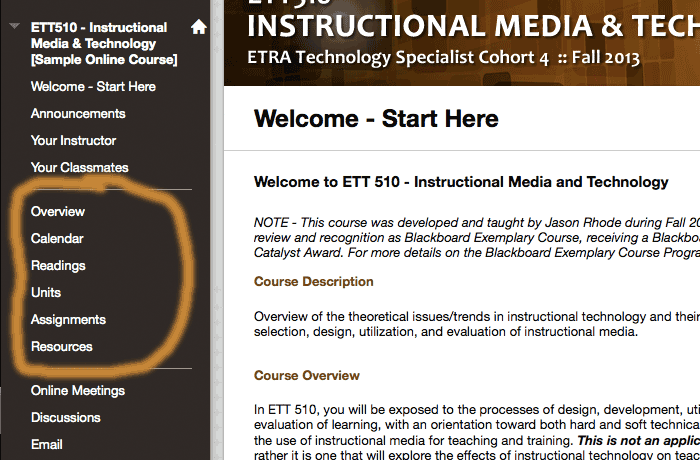
You will also be able to view a copy of your course syllabus to help you stay on top of your weekly readings, lectures, and assignments.
How do you listen to class lectures?
Your professor will be the one who decides how to deliver lectures, but in most cases, you learn and absorb class material on your own as you complete the assigned readings and related assignments.
In some rare cases, you may be required to watch live lectures at a set time each week, but this is the exception, not the rule.
What kind of classroom participation is required in online courses?
Classroom participation.
Ahhhh, the easy A when you’re attending class on campus.
With accelerated online classes, classroom participation is measured by your level of engagement with the online discussion boards.
In my experience, this is also an easy A.
Each instructor has their own way of measuring participation. Some instructors require that you post once per week and reply to two other students’ posts. Other instructors don’t require you to reply to other students. It just depends on your professor.
If this is an area of concern for you, you can generally view a copy of the course syllabus before you register for a class. That’s what I do.
Here’s an example of class participation requirements for an online history course:
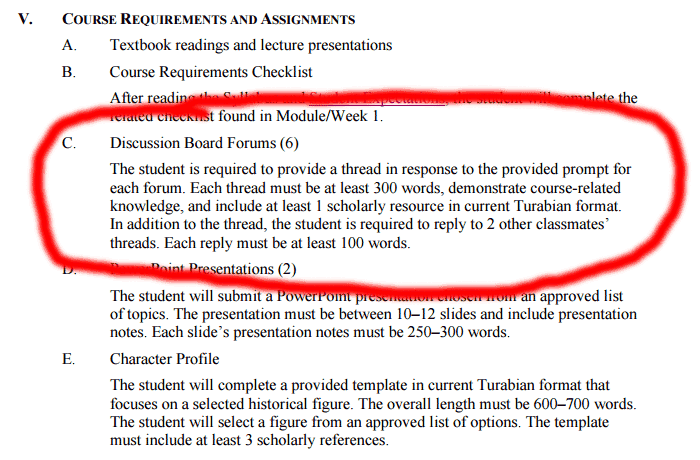
As you can see from the course syllabus, in addition to weekly readings and lecture presentations, you’re also responsible for replying to a discussion question with a minimum of 300 words, demonstrating course-related knowledge, and at least 1 source. Then, you have to reply to 2 other classmates with a minimum of 100 words.
To give you an idea of the look and feel of your course discussion board, here’s an example from the Blackboard online learning portal:
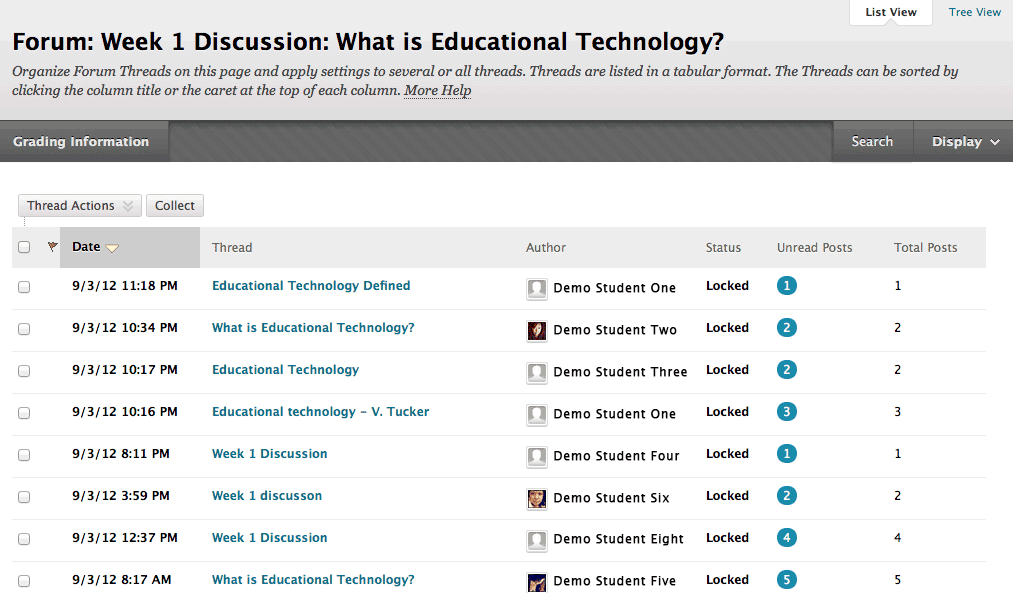
In my experience, posting to the discussion board takes a minimal amount of time each week, but it’s a great way to interact with your classmates from around the country (or globe).
Do you need textbooks in online college classes?
Most instructors require textbooks, but you can usually pick up the most popular textbooks as eBooks (purchase or rental).
This is a much cheaper option.
For example, let’s say you need a textbook for your Project Management class. The hardcover book goes for $139 on Amazon. The same textbook can be rented as an eBook for $11.99 at Chegg (or a similar book rental site).
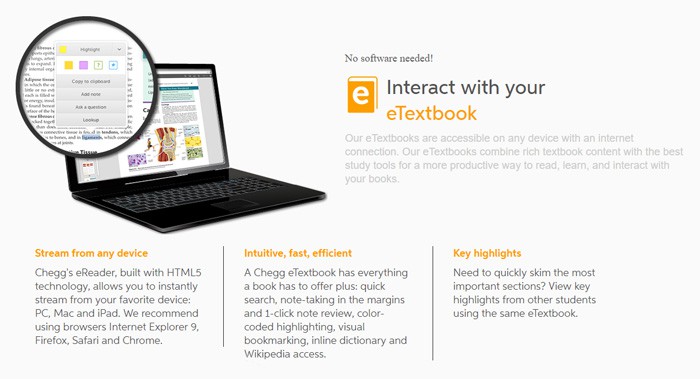
Some instructors may forego a textbook in favor of a “readings packet” which might be available on the class’s main Blackboard page as a PDF file or with links to articles, videos, etc. It really depends on what kind of class you are taking and the instructor’s preferences.
Most Common Assignments in Online Classes
Every professor has their own preferences, but the majority of online instructors use one or more of these assignment types:
- Discussion boards. A popular way to recreate classroom discussions on a virtual platform. Usually, these are fairly informal, short assignments.
- Quizzes. Quizzes are taken online. They’re generally true/false or multiple choice.
- Midterms. These come in a variety of formats: Timed/Untimed, Multiple Choice, True/False, Short Answer, or Essay. It depends on the professor.
- Essays / Research Papers. These could be anything from 1-2 page essays to full-fledged research papers.
- Team Project. An occasional class may require a team project. This is a pretty broad “catch-all” category that could include art projects, business models, or writing software code.
- Labs. Some science and technology classes will have lab work. This is, obviously, less likely for an online class, but it’s not inconceivable. For example, some IT classes may have a few computer labs as part of the course requirement.
- Case Studies. Case studies can be a pretty common component in business classes, but other majors use them as well. For example, your finance class might require you to study the financial statements for Krispy Kreme to give you an opportunity to apply some of the core competencies you’ve learned in class.
How do you turn in assignments for online college courses?
The instructor will tell you how to submit your work on the first day of class.
In most cases, assignments are submitted through your online learning portal, whether that’s Blackboard or Moodle.
In the case of quizzes and tests, you simply click on the “exam” link and answer all of the questions from inside the learning portal. When you finish the assignment, just click submit.
If you need to submit an essay or research paper, you generally do this by uploading the assignment inside your learning portal.
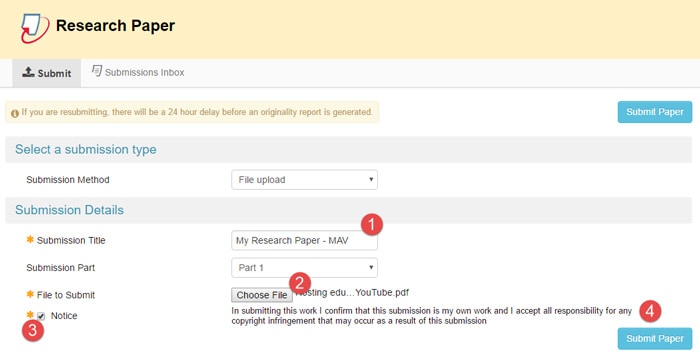
It works a lot like sending an email attachment. Just choose the file and click upload.
How are accelerated online classes graded?
Generally, accelerated classes are graded the same way as regular classes, with either letter grades or total point accumulation systems.

Most instructors will post your grades in a Grade Center on the course software page as you go so you know what your accumulated grades are on any given day.
How do you take exams in an online class?
The most common exam formats are taken through the Blackboard or Moodle learning platform. These can be timed/untimed, true/false, multiple choice, fill in the blank, a combination of these, or an essay.
In the example below, you can see how a quiz might appear in the Moodle learning portal.
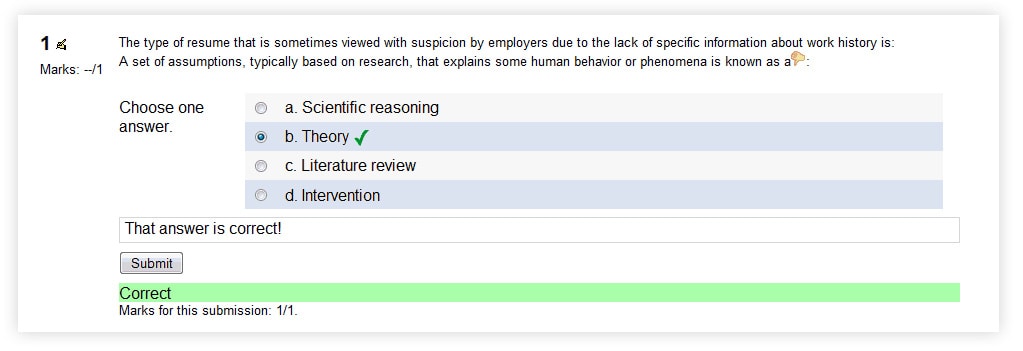
In some cases, an instructor may require a proctored exam. Just contact the testing center at your local community college or university. They will setup a date and time for you to take the exam.
How do you contact your professor?
Email is the most common way to reach out to your professor, but the online learning portals also have chat rooms for more general questions.
Some professors may also give a phone contact for their office or their department secretary.
In most instances, instructors make a reasonable effort to get back to you within 24 to 48 hours.
How do you get extra help when you need it?
It will depend on the university.
The syllabus will usually tell you how to access the online library, research portals, and the university’s technical assistance department (if you’re having problems with the course software).
Some colleges provide the same services as a traditional class such as a writing center, tutoring, counseling, and mentors. Blackboard and Moodle also have links to a number of resources in the “Tools” menu on the course page.
What kind of hardware and internet requirements are there?
As an online student, you’ll be dependent on your computer and your internet connection.
Each university will set its minimum IT requirements, but let’s take a look at the University of Phoenix as an example.
Hardware requirements:
- A computer processor of 2 GHz or faster
- 4 GB RAM or greater
- A high speed internet connection with a connection speed of 1.5 MB/s or better.
- Speakers/Headphones and Microphone
- Web camera capable of video web conferencing
These are considered the minimum requirements.
How many weeks are accelerated classes?
Accelerated courses come in several formats and vary by school.
In general, an accelerated course will cover the same course material as a 16-week semester-long class, but in less time.
The most common lengths are 4 weeks, 5 weeks, 6 weeks, and 8 weeks long. Although 4 week online college credit courses aren’t as common as 8 week online college courses, they are growing in popularity.
How many hours per week will I spend in accelerated classes?
Generally first year, freshman level classes require a bit less work and upper level classes will demand more of you.
A general rule of thumb is: you should expect to spend two to three hours working outside of class for each hour you spend in it. So, if it’s a 3-hour-a-week lecture, you will probably need to spend 6-12 hours a week doing reading and homework.
Here’s a list of colleges with 5 week online courses.
4 week, 5 week, 6 week, or 8 week courses?
Whether you want to enroll in 4 week online college courses or 8 weeks, you can shorten the time it takes to earn your degree and get one step closer to your long-term goals with accelerated classes!

